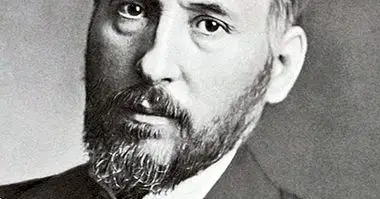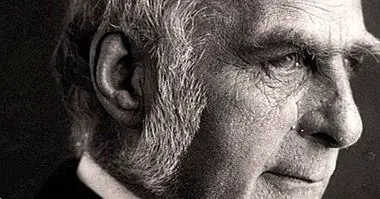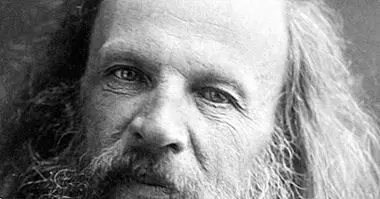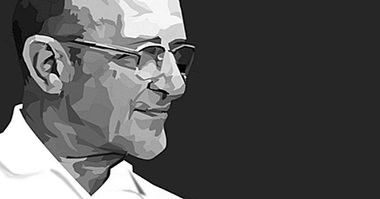Hans Eysenck: summary biography of this famous psychologist
Hans Eysenck was a German-English psychologist well known for his theories about personality . He has gone down in history as one of the most influential figures in modern psychology and his theories are still being discussed and used by psychologists and other experts in human behavior.
In this article we review the life of this psychologist from a very short biography of Hans Eysenck , detailing some characteristics of his life and work.
- Related article: "History of Psychology: authors and main theories"
Hans Eysenck: biography of one of the fathers of modern psychology
Hans Eysenck was born on March 4, 1916 in Berlin, Germany. He grew up and lived in that city until the year 1934, when he was forced to take refuge first in France and then in the United Kingdom by the Nazi regime.
His parents were actors, that when they separated and faced the conditions of the country, they moved to France. Eysenck grew up with his maternal grandmother, Frau Werner, with whom he had a free education and full of intellectual and cultural stimuli. He quickly stood out as a good student and even a good athlete.
Finally he had to emigrate and was in London where he began to study psychology (at the University of London). In the same city, he worked as a clinical psychologist and even worked in the Institute of Psychiatry.
Hans Eysenck is credited with having built one of the strongest personality paradigms in the history of psychology. There are those who even consider him "the father of psychology".
- You may be interested: "Eysenck's Theory of Personality: the PEN model
His fields of work and research
While a student, Eysenck participated in various meetings and reviews of intelligence theories. Along with some American intellectuals, He also developed therapy options other than psychodynamics, which was the most popular at the time.
He also realized that psychology as a science was in the background with respect to psychiatry. Eysenck remained interested in claiming the status of the first and seeking cooperation between them.
In the same way remained critical to the diagnoses made by psychiatry . I saw many contradictions and difficulties to defend them theoretically. From these experiences he developed his own model of personality, recovering many of the approaches of philosophy and more classical psychology.
Beyond measuring the personality, insisted on the value of knowing it, and interested in solving the problem of the taxonomy used in psychiatry, Eysenck argued that the personality does not occur in the continuous normality-neurosis-psychosis, but that the dimensions that best represent this are neuroticism and psychoticism .
From this he made studies with many of the people with whom he worked as a clinical psychologist, people who had some psychiatric diagnosis and people who did not. After analyzing the data, he proposed two key factors for personality: neuroticism and extraversion.
Years later and from new studies, add a new new dimension: psychoticism. Finally I present a hierarchically organized model in four levels ranging from personality types and their features, to the specific answers that correspond to each one. This work gave shape to what is known as the personality PEN model .
- Maybe you're interested: "The theories of human intelligence"
From personality to intelligence
Through his studies, Eysenck developed the famous model of psychotic personality-extraversion-neuroticism, with biological factors for each one, that is, highlighting the role of genetic inheritance in the development of personality. For example, He argued that psychological differences and their hereditary determinants can be tested empirically. .
This was what finally led him to develop research on issues related to personality, but that go a little further, such as intelligence, creativity, the relationship between genes and culture, crime, sexuality, the relationship between personality and diseases or addictions, among others.
Many of his studies on Intellectual Quotient and its relationship with cultural systems received many criticisms. For example, his theories have been used both to justify racial dynamics and to refute them.
His latest studies focused on the analysis of creativity and its relationship with biological factors. Y his personality model has been adapted to numerous psychometric tests to evaluate both intelligence and personality traits. Currently they are used in the clinical, educational, vocational and work areas.
Outstanding works
Among his most important works are: Personality Structure and Measurement of 1969 (Structures of personality and measurement), The Structure of Human Personality of 1970 (The structure of the human personality), Genes, Culture and Personality of 1989 (Genes, Culture and Personality).
On the specific relationship between intelligence, personality and biology, some of his most important works are The Biological Basis of Personality of 1967 (The biological basis of personality) and Personality, Genetics and Behavior of 1982 (Personality, genetics and behavior).
Bibliographic references:
- Schmidt, V., Oliván, M.E., L, F. et al (2008). Hans Jürgen Eysenck. Life and Work of one of the most influential scientists in the history of psychology. Advances in Latin American Psychology / Bogotá (Colombia), 26 (2): 304-317.



















